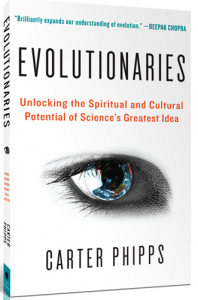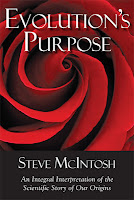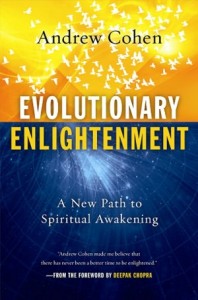
Here are three books written by three people who are linked in their work and/or their writing, all related to the subject of evolution. Phipps was editor of What is Enlightenment, later EnlightenmentNext, publications sposored by Andrew Cohen and in which Cohen’s work and dialogues with Ken Wilber were featured. Phipps and McIntosh reference each other’s work, as well as the work of Andrew Cohen 9among others). The Foreword to Cohen’s book is by Deepak Chopra and the cover of Phipp’s book has a quote from Chopra at the top. Two of them, Cohen and McIntosh have the same publisher.
These are not light reading. Nevertheless, the styles of the authors make them easy reading, interesting reading. Indeed, Phipps’s work falls into my category “Gosh, I wish I could have written that!” reserved for talented writers who tell their stories well. Not that the others aren’t well written, too, mind you!
 Carter Phipps (2012). Evolutionaries: Unlocking the Spiritual and Cultural Potential of Science’s Greatest Idea. New York: Harper Perennial.
Carter Phipps (2012). Evolutionaries: Unlocking the Spiritual and Cultural Potential of Science’s Greatest Idea. New York: Harper Perennial.
Phipps begins linking the ideal of evolution to Plutarch’s “difficult course between the precipice of godlessness and the marsh of superstition.” Indeed this is a theme that pervades this work, since “Evolution is one of those bellwether ideas that is able to uniquely track the currents of our cultural zeitgeist, simply because its roots reach so deep into the way we understand reality.”
Evolution is an integrating concept. It is transdisciplinary and encourages us to think big, to play at the meta level. It has been an important arena for the sciences, which Phipps outlines beautifully. And it has been a realm of exploration for philosophy, as well. Generalists escaping the confines of boundary inhibiting specialisms have turned to a lens of what Phipps calls evolutionary time. We escape the limitations of our immediate experience of time and expand our consciousness, awareness, and imaginations.
In service of what? Cooperation! As David Loye has laid out so convincingly in his many books on the later work of Darwin, the human species leads all others in the use of cooperation for the unfoling of our evolutionary path. What direction is that path taking us? Progress and Anomie? Or some larger purpose. Phipps unfolds the history of this thinking in science and philosophy
It is not surprising that the author also wrestles with the individual and collective aspects of evolution a la integral theory, that is, the challenge of their relationship and roles in development. “Spiral Dynamics is interesting in that it does seem, at least to some degree, to apply to both. He cites a memorable visit with Dr. Don Beck and quotes Clare Graves, “Briefly, what I am proposing… is that the psychology of the nature human being is an unfolding, emergent, oscillating, spiraling process marked by progressive subordination of older, lower-order behavior systems to new, higher-order systems as man’s existential problems change.” And Phipps adds, “Evolutionaries express an idealism that says the future is open-ended and extraordinarge change and development is absolutely possible. But they also need to embrace a realism that acknowledges that evolution takes time and that it happens within the context of deep-rooted and complex historical patterns.” Evolution ain’t easy!
Drawing on an integral perspective evolutionaries have a renewed ethical context for their work and understanding that is Kosmo-centric breaking away from the merely local and personal, Evolutionary spirituality embraces the world and the future. This provides a foundation for our knowing that what we do in our lives matters and is ethical.
 Steve McIntosh (2012). Evolution’s Purpose: An Integral Interpretation of the Scientific Story of Our Origins. New York: Select Books, Inc.
Steve McIntosh (2012). Evolution’s Purpose: An Integral Interpretation of the Scientific Story of Our Origins. New York: Select Books, Inc.
Not quite on the market yet, as this is written, McIntosh addresses evolution as controversy and notes, “we have recently come to the point where the scientific facts themselves increasingly demonstrate that a purely physical explanation of the phenomenon of evolution, one that can only include empirical data gathered from sensory observation, is now relative exhausted.” We must also attend to the philosophy of evolution.
Rejecting the creationists perspective, McIntosh unfolds a story of evolution that is intended to appeal to the scientific community, as well as a larger audience. He is presenting not only the idea of a materially evolving Universe, but the evolution of humans and their worldviews. In particular, his “conception recognizes the sequential emergence of values-based stages of human cultural development.* His is an integral and dialectal Universe. His focus is on human development, changing values as relational structures and a focus on the “integral trinity”, Beauty, Truth and Goodness.
The heart of his discussion is, as the book’s title suggests, “the meaning, value, and purpose of evolution overall.” This purpose is grounded in Beauty, Truth and Goodness. This leads to an evolutionary theology with ten tenets that suggest that “the ultimate purpose of evolution in the finite universe is to bring forth an experiential form of perfection—not a predetermined kind of perfection, but rather a perfection that has been directly experienced and personally chosen and achieved through the faithful travails of evolutionary free will creatures.” All of this can be put to use in an intentional evolutionary focus of our being and doing. And McIntosh presents this well through an integral lens.
 Andrew Cohen (2011). Evolutionary Enlightenment: A New Path to Spiritual Awakening. New York: Select Books, Inc.
Andrew Cohen (2011). Evolutionary Enlightenment: A New Path to Spiritual Awakening. New York: Select Books, Inc.
It may seem we are stepping a bit far from the subject of leadership with a review of this clearly spiritual development book. However, if we are to understand leadership integrally, this includes understanding individual and collective perspectives and experiences that are cognitive, emotional, physical AND spiritual—among others. In this case I was struck by Deepak Chopra’s Foreword in which he points to the Tenets of Evolutionary Enlightenment presented by Cohen in the latter part of the book, all of which can be related to the individual in a leader role:
1. Clarity of Intention: “the essential nature of the evolutionary impulse itself: the wholehearted, passionate intention to exist, to develop, to become, to evolve.” In the complex dynamics and changing influences, internally and externally, of our families, teams, organizations, communities and nations, adapting is critical. To adapt we must learn, internalize the learning and recast out understandings in the process.
2. The Power of Volition: we must try “to be responsible for nothing less than the destiny of the evolutionary process, here and now, as ourselves.” This includes making “the noble spiritual effort to take responsibility for all of what makes you who you are.” By taking responsibility for who we are, our worldview, our behaviors, we recognize and can apply our energy intentionally, with greater clarity. We do not fall into the trap of blame.
3. Face Everything and Avoid Nothing: This one taps into to who we have been since we were very small children. What beliefs and fears have we learned and developed in our lives that cause us to seek escape from what is undesirable? Cohen sees this tenet as “our potential to experience unobstructed awareness—awareness that is free from the psychological self-protective habit of avoidance.” This one is tough—for some of us, at least. It’s big. It means stepping back into and learning from our experience of avoidance. and what we avoided. This is the work of owning and accounting for our lives. It is our after action review! And it engaging shadow. Those who step into leader roles find their failures to do this negatively influence their relationships, their thinking, and their doing.
4. The Process Perspective: Paying attention to process is essential in leadership occurrences. The process unfolds both the what and the how of what we are doing. Says Cohen, “It points us directly to the liberating viewpoint that emerges when we see every aspect of our human experience as part and parcel of the vast impersonal cosmic process.” Need I say more?
5. Cosmic Conscience: The prior four tenets can be developed through practices. This one cannot. Cohen states, “Cosmic Conscience, represente the fundamental motive or raison d’être of the evolution impulse or Authentic Self. It represents a threshold that changes everything when one has crossed it; it puts everything into context. And the spiritual pulse becomes primary. One has shifted from Ego attachment to the Authentic Self, the spiritual goal of all beings. Even within the context of leadership, such authenticity and transcendence of ego means that we can recognize leadership as an evolutionary process in the life of a system.
Our role is not only our personal development, then, but actively creating the conditions in which the five tenets can be effectively realized.

Russ,
Thank you for your triple review of these important evolutionary books. Having read two of the three (since McIntosh’s isn’t publicly available yet), I agree that they provide a view of the big picture–who we are and where we can go–that is surprising, even for someone who regularly looks for the larger context.
For me, seeing all three reviewed together in the context of developing as a leader points to the power of the Integral view: that the exterior and the interior are fundamental and coarising, and that developing in one WILL have an effect on the other. The same holds for the individual and collective. Thanks again for your thoughts on these.
Best,
Steve